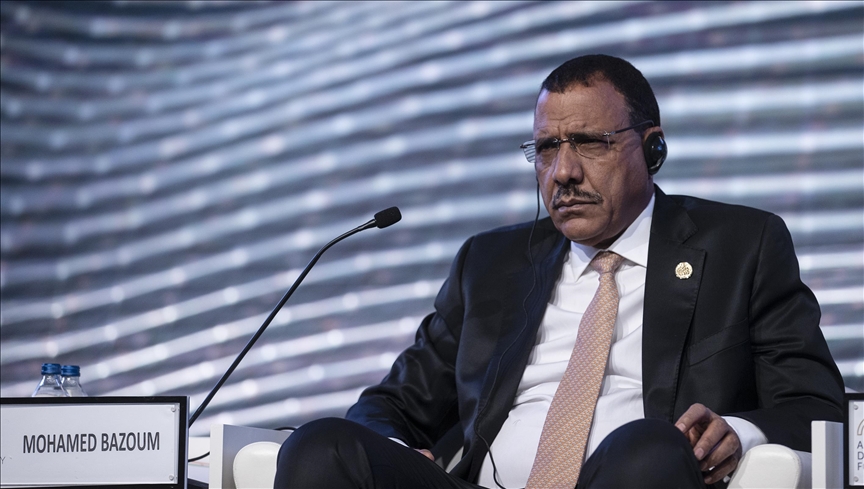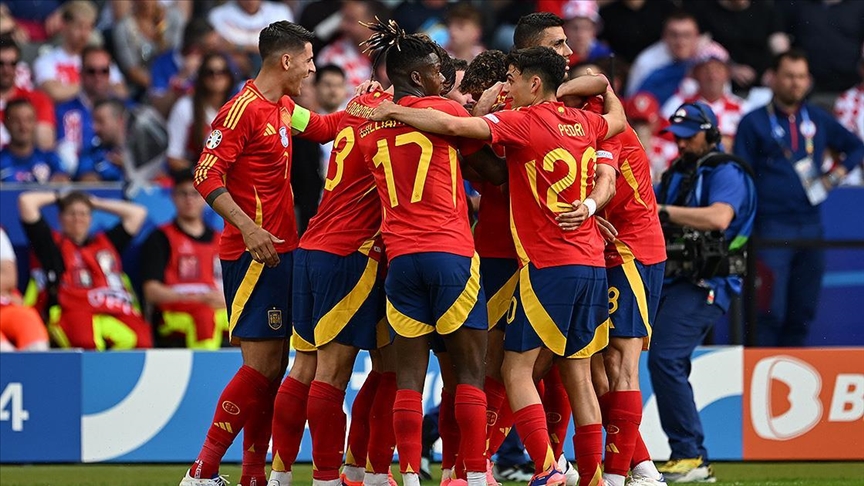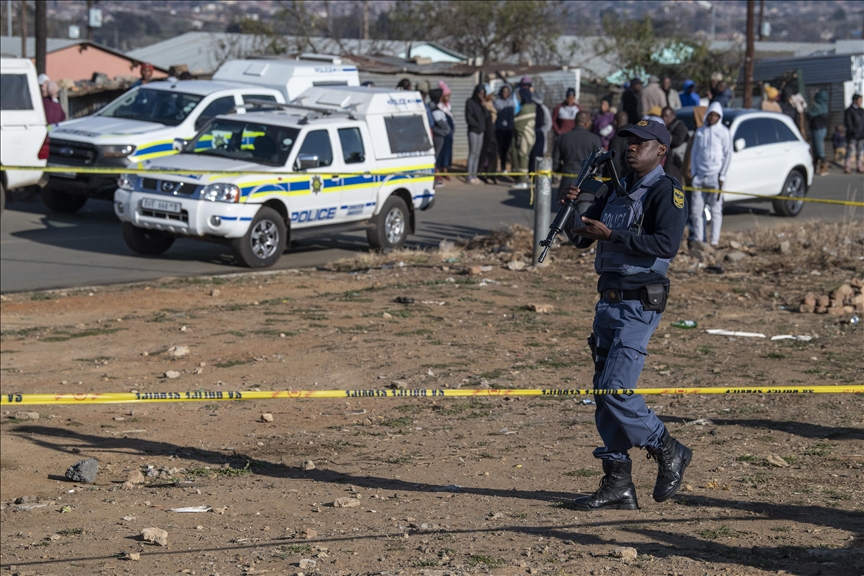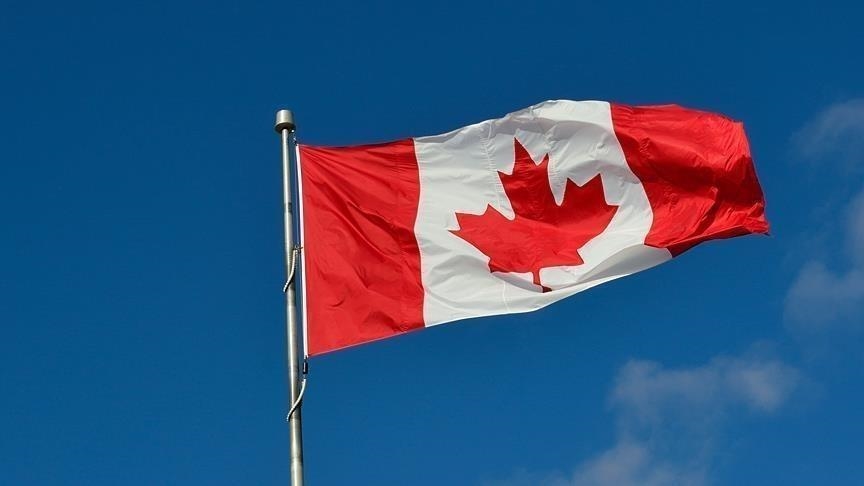5-member African bloc force fails to configure on ground, unable to fight terrorism: Niger president
NIAMEY, Niger
Niger’s President Mohamed Bazoum has said that the joint force of five African countries has never functioned properly since its inception over nine years ago, even before one of the member states, Mali, withdrew last year, because its configuration did not fully correspond to the needs on the ground.
Bazoum spoke about the fight against terrorism, geopolitical changes in the region, and his country’s relations with Türkiye in an exclusive interview with Anadolu, praising the Turkish people for their maturity in the country’s recent presidential and parliamentary elections.
The Group of Five for the Sahel Joint Force, or G5 Sahel, an institutional framework for regional cooperation in development policies and security matters in West Africa, has never functioned properly, even before Mali’s withdrawal on June 30 last year, the president said, while citing its configuration, which he claims does not fully correspond to the needs on the ground.
However, he urged greater cooperation with neighboring countries in the fight against terrorism.
He said the country has military cooperation with a number of friendly countries, including France, which has soldiers stationed on Nigerien territory to combat terrorism.
“These French soldiers were in Mali until about a year ago. However, the format in which they operated in Mali, which made up of setting up purely French operations with no relationship to the Malian army, has changed,” he said.
According to the president, the concept being implemented in Niger entails organizing joint operations involving French and Nigerien military personnel.
“The French military is focusing on areas where we have weaknesses, particularly in the air. The feedback I have received from some of the operations we have carried out in this area in the last two to three months has been extremely positive. We achieved results that would not have been possible if we had not combined our resources with those of the French,” he added.
According to Bazoum, Germany will not send all of the troops who participated in the UN’s Multidimensional Integrated Stabilisation Mission in Mali (MINUSMA), and there is no plan for intervention on the ground between the two countries.
Instead, German troops are training Niger’s troops. They have been doing so for several years and will continue to do so, he said, adding, “We are very positive about the results of our cooperation with Germany.”
“The Tilia Battalion, for which they have built remarkable infrastructures and acquired impressive equipment from Germany, is a model of military cooperation between a country like ours and a rich country like Germany. And this cooperation includes, in particular, the training of special forces,” he added.
– Africans’ migration to Europe
Bazoum urged European partners to “re-establish links between Europe and Africa, a new political perspective, and co-development” in order to face the challenges, particularly migration.
The fact that Africa is now next door to Europe is a source of contention in Europe. As Africa is a neighboring continent, the phenomenon of migration has become a “real poison in Europe.”
“If Africa is a poor continent with an uneducated population and high demographic growth, young Africans will always want to go to Europe. All efforts to erect barriers to the entry of young Africans into Europe will be futile,” he asserted.
“Instead of Africa being poison for Europe, I think it would be better to look at other perspectives, which include promoting development policies in Africa, using European capital to ensure that young Africans can create wealth here, by promoting education and training in particular, because it is a potentially very rich continent,” he suggested.
He added that Europe will then have a neighbor who will be useful to it, and their destinies will be those of neighbors for whom the word cooperation will have real meaning.
“I really want to start this debate. I would like to change Europe’s perception of them and have a different understanding of Africa, and for this understanding to be accepted in the same way on both sides of the Mediterranean,” he added.
– Turkish companies’ cooperation model should be emulated
Niger’s President Mohamed Bazoum has criticized European countries for their economic policies toward the African continent while praising Turkish President Recep Tayyip Erdogan for promoting business activities in his country and urging the West to emulate the Turkish companies’ cooperation model.
He described the country’s relations with Türkiye as “outstanding,” noting that “Turkish companies come to Niger, invest here, create wealth and employment,” and that “that is what we welcome.”
He promised to create an environment conducive to foreign investment, as well as to continue the development of good relations with Türkiye, which he said have grown both at the government-to-government and private-sector levels.
“Over the last ten years, we have been very pleased with our relations with Turkey. Our relationship has been revitalized thanks to the foresight of President Erdogan,” Bazoum said, adding that “the volume of cooperation between Türkiye and Niger has increased significantly and covers a number of areas that are priorities for our people and are part of our efforts to combat poverty.”
The Niger president argued that European companies should learn from Turkish companies’ African cooperation model.
It is not up to Asian or American businesses to create wealth in Africa. It is up to European businesses to do so, he said, stressing that in this regard, Türkiye is a model of commitment to the development of African countries, even in the context of private investment.
“You’ve seen what Turkish companies are doing here. They do not consider that this is an African country where there may be risks if you do not speak the language,” he said, adding that they have ignored all of these considerations and taken some risks that have paid off.
“This is an investment model that is expected of all European companies in Africa,” he asserted.
– Financial pledges unfulfilled
The president also spoke about the two-day fundraising event held on December 5 and 6 in Paris, saying that €31.4 billion ($34.37 billion) was pledged by private investors and the country’s technical and financial partners – international financial institutions, UN agencies, the European Union, and other development banks – to support the country’s Economic and Social Development Plan (ESDP) for the years 2022-2026.
However, he said the pledges have not yet been fulfilled.
“It was not a matter of saying we are going to commit to projects. It is really about ensuring that these projects are designed and implemented, which is a major challenge for the Niger government,” he said.
The availability of these resources is relatively uncertain, he said, adding that it is up to the government to ensure that the country can design projects and create the conditions for mobilizing the resources that Niger has identified in the event.
“This presents a significant challenge for our administration, whose capacity may be limited and may prevent us from fully meeting the commitments made by our various partners. We are working hard to ensure that our administration is efficient. That it is capable of ensuring that wherever we have a partner who has announced a commitment, we go and get it and create the conditions for it to be implemented in the form of concrete projects,” he added.
*Writing by Alex Sinhan Bogmis
Anadolu Agency website contains only a portion of the news stories offered to subscribers in the AA News Broadcasting System (HAS), and in summarized form. Please contact us for subscription options.




